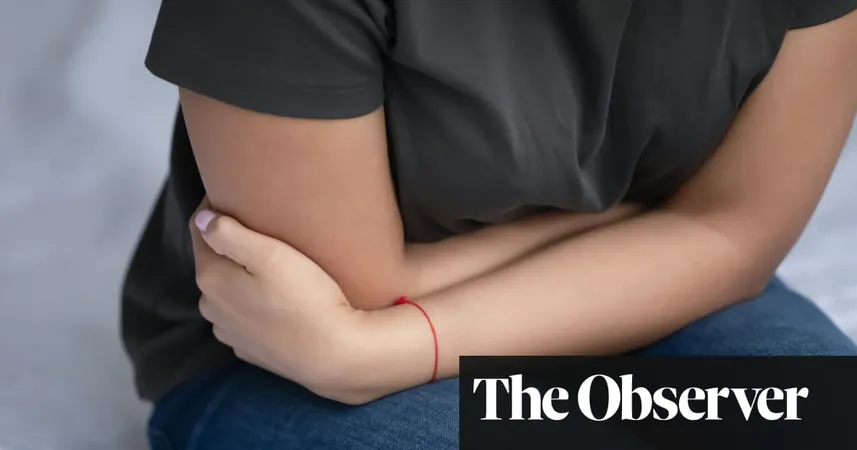
Groundbreaking Research Links Diet to Endometriosis Pain Relief: What You Need to Know!
2025-04-05
Author: Amelia
Introduction
A new monumental study on endometriosis has uncovered shocking insights into how dietary changes may significantly alleviate pain for many women suffering from this chronic condition. The most extensive international survey to explore the relationship between diet and endometriosis, which involved 2,599 participants, revealed that a staggering 45% of women who eliminated gluten and another 45% who cut dairy from their diets reported notable improvements in their pain levels.
Findings
Caffeine reduction also yielded promising results, with 43% of participants experiencing reduced discomfort after cutting back on coffee and other caffeinated beverages. Alcohol consumption, another significant factor, showed a surprising impact: 53% of those who reduced their alcohol intake reported lower pain levels.
Expert Insights
Philippa Saunders, a leading researcher and professor of reproductive steroids at the University of Edinburgh, expressed her optimism, stating, "We are on the brink of a significant breakthrough in understanding how diet affects endometriosis symptoms. It's empowering for women to know they can take actionable steps towards managing their pain."
Endometriosis Overview
Endometriosis occurs when tissue similar to the lining of the womb develops in other areas of the body, affecting around one in ten women of reproductive age in the UK alone. Unfortunately, research into its causes and effective treatments has lagged far behind the urgency of the issue. Typically, women endure an agonizing average of seven years before receiving a diagnosis due to a lack of awareness and understanding of the disease.
Research Background
Led by Edinburgh University and recently published in the American Medical Association’s journal JAMA Network Open, the study asked participants about their dietary changes and the effectiveness of various supplements. Researchers speculate that the improvements noted by those who eliminated gluten or dairy might be linked to positive modifications in gut bacteria.
Dietary Impacts
Reducing caffeine may also be beneficial due to its potential effects on sleep quality—pain often intensifies when individuals are sleep-deprived. Meanwhile, alcohol reportedly affects estrogen levels, potentially exacerbating endometriosis symptoms since estrogen plays a crucial role in the condition's progression.
Symptoms of Endometriosis
Endometriosis can cause intense pelvic pain, particularly during menstruation, but it can also lead to a broad spectrum of discomfort, from sciatic pain to flu-like joint pain. Interestingly, the tissue associated with endometriosis can stimulate the growth of new nerve cells and increase the sensitivity of existing ones, amplifying pain signals. This is further heightened by inflammation—a hallmark of endometriosis that experts believe could be mitigated through dietary alterations.
Additional Findings
The study also discovered that nearly 40% of participants experienced pain relief after cutting out processed foods, while about a third reported improvements after eliminating garlic and onions, foods notorious for causing bloating.
Advice for Patients
Experts advise patients to consult healthcare providers before making significant dietary shifts. There is a call for larger-scale studies featuring randomized diets to robustly establish the relationship between diet and endometriosis. Such research could shed light on inflammation and pain measurements, enhancing the understanding of the condition.
Research Reach
The Edinburgh research leveraged self-reported pain levels from individuals across 51 countries, including 1,115 respondents from the UK. Francesca Hearn-Yeates, the lead researcher, underscored the necessity for further exploration, indicating that women are in dire need of any strategies that could alleviate the pain associated with endometriosis.
Expert Opinions
Jo Hanley, a specialist adviser at Endometriosis UK, noted the wealth of anecdotal evidence supporting the idea that dietary changes can lead to pain relief, though she acknowledged that responses can vary. She emphasized the potential of anti-inflammatory diets rich in fruits, vegetables, beans, and whole grains while advising women to keep a food and symptom diary to pinpoint specific triggers.
Meanwhile, researchers like Ying Cheong from the University of Southampton stress the need for clinically rigorous research to validate these subjective findings. Dr. Nilufer Rahmioglu from the University of Oxford reinforced the importance of these insights, highlighting the necessity for ongoing research into non-hormonal management strategies for endometriosis.
Conclusion
In summary, this groundbreaking study opens the door for women struggling with endometriosis to explore dietary changes that could significantly impact their quality of life, while also highlighting the desperate need for further research in this under-recognized area.









 Brasil (PT)
Brasil (PT)
 Canada (EN)
Canada (EN)
 Chile (ES)
Chile (ES)
 Česko (CS)
Česko (CS)
 대한민국 (KO)
대한민국 (KO)
 España (ES)
España (ES)
 France (FR)
France (FR)
 Hong Kong (EN)
Hong Kong (EN)
 Italia (IT)
Italia (IT)
 日本 (JA)
日本 (JA)
 Magyarország (HU)
Magyarország (HU)
 Norge (NO)
Norge (NO)
 Polska (PL)
Polska (PL)
 Schweiz (DE)
Schweiz (DE)
 Singapore (EN)
Singapore (EN)
 Sverige (SV)
Sverige (SV)
 Suomi (FI)
Suomi (FI)
 Türkiye (TR)
Türkiye (TR)
 الإمارات العربية المتحدة (AR)
الإمارات العربية المتحدة (AR)